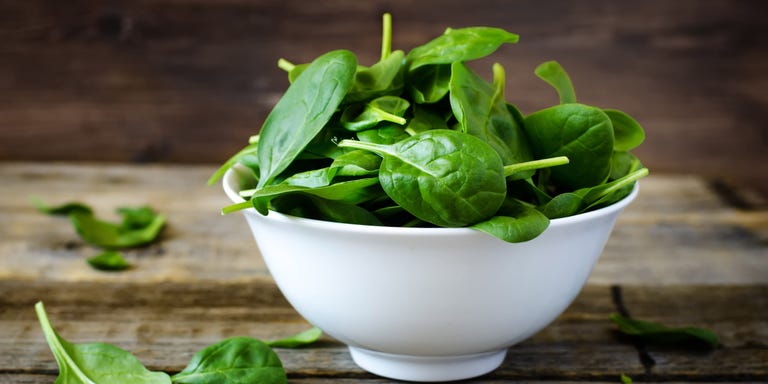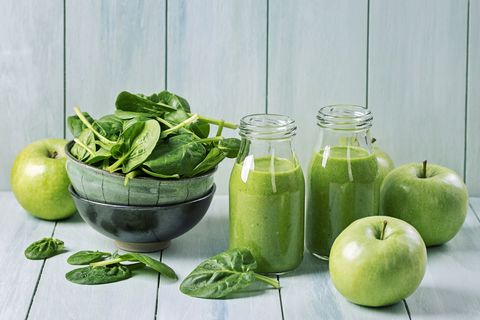
Call it the Popeye effect. While many associate spinach with its iron content, it’s actually the nitrates in those green leaves that give you a real-life power-up. Eating a diet rich in nitrates can potentially improve athletic performance, reduce cholesterol levels, and lessen the risk of heart disease, among other major pros:
Contents
Nutrition Stats
Serving Size: 1 cup raw spinach
- 7 calories
- .9 g protein (2% DV)
- 1 g carbohydrate
- 0.7 g dietary fiber (3% DV)
- 29.7 mg calcium (3% DV)*
- 81 mg iron (4% DV)
- 14.7 mg phosphorous (1% DV)
- 167.4 mg potassium (4% DV)
- 23.7 mg magnesium (6% DV)
- 8.4 mg vitamin C (14% DV)
- 263 DFE folate
- 2813 IU vitamin A (56% DV)
- .059 mg vitamin B6 (3% DV)
- .61 mg Vitamin E (2% DV)
- 145 ug vitamin K (181% DV)
- .16 mg zinc (1% DV)
Serving Size: 1 cup boiled, unsalted spinach
- 41 calories
- 5.35 g protein (11% DV)
- 6.75 g carbohydrate (2% DV)
- 4.3 g dietary fiber (17% DV)
- 245 mg calcium (24% DV)*
- 6.43 mg iron (36% DV)
- 101 mg phosphorous (10% DV)
- 839 mg potassium (18% DV)
- 126 mg sodium (5% DV)
- 157 mg magnesium (39% DV)
- 1.37 mg zinc (9% DV)
- 17.6 mg vitamin C (29% DV)
- 263 DFE folate
- 18866 IU vitamin A (377% DV)
- .436 mg vitamin B6 (22% DV)
- 3.74 mg vitamin E (12% DV)
- 889 ug vitamin K (1111% DV)
*The calcium in spinach has been shown to have low bioavailability.
Health Benefits of Spinach
Besides vitamins and nutrients, spinach is filled with nitrates and glycolipids, which may reduce inflammation. Here’s what else this veggie can do:
- Help your heart: The glycolipids in spinach promote the body’s production of nitric oxide (NO), which helps dilate blood vessels and reduce atherosclerosis.
- Improve cholesterol: The nitrates have the potential to significantly lower triglycerides, total cholesterol, and LDL levels.
- Keep blood glucose in check: Nitrates may also help lower blood sugar levels.
- Build muscle: Yep, nitrates again. They’ve been shown to enhance athletic performance by improving blood flow and muscle contractions.
- Reduce your risk of cancer: Spinach contains a chemical called N-oxalylglycine (NOG) that has a potential tumor-suppressing effect.
Now that you know why cartoon sailors down this stuff by the can, get your top questions on spinach, answered:
Should I drink green juice?
Adding spinach to drinks may be a healthful way to incorporate this nutrient-rich vegetable into your diet, especially if you’re on-the-go. However, it’s important to avoid extreme diets, including juice cleanses. Drinking only green juice for long periods of time can increase your risk of developing kidney stones and — in extreme cases —kidney failure due to the oxalates in spinach.
Cooking or soaking the spinach first reduces how much of this compound gets absorbed during digestion.
Should I eat it cooked or raw?
Boiling spinach may significantly reduce the amounts of those good-for-you nitrates, so raw or steamed is often the way to go. Pureeing spinach leaves may also increase the body’s ability to absorbthe healthful compounds lutein and beta-carotene compared to uncut spinach.
How should I prepare it?
Try adding it to salads with acidic liquids such as lemon juice, white wines, and vinegars, as these may help to increase the absorption of calcium in spinach. Also, adding fat to raw or steamed spinach helps to free up its beta-carotene content. No wonder Popeye’s girlfriend is named Olive Oyl!
Need some ideas? These three recipes are some of our favorites:
- Gingery Chicken and Spinach Stir-Fry
- Sweet Potatoes Stuffed With Black Beans and Spinach
- Wild Rice and Spinach Egg Bowl
[“source=goodhousekeeping”]

